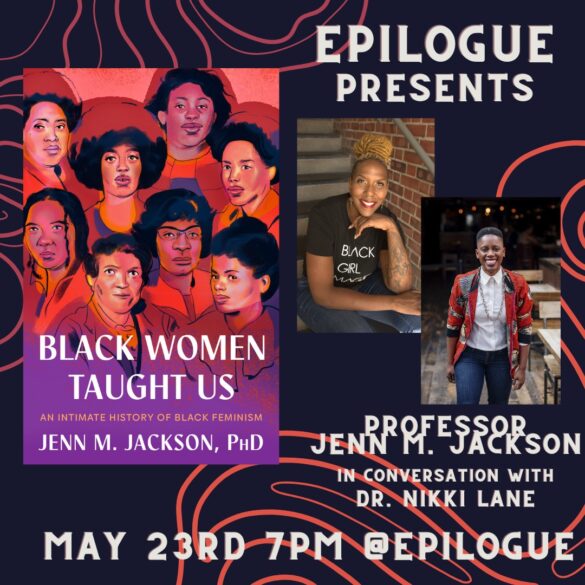Black Women Taught Us:
Professor Jenn M. Jackson in conversation with Dr. Nikki Lane
Join us for a night of great conversation with Jenn M. Jackson. We will be celebrating the release of her book Black Women Taught Us.
About the book
Fearless essays that reclaim the work and words of Black women activists, abolitionists, and movement makers who have long fought for liberation and justice—from a beloved Teen Vogue columnist and an essential new voice in Black feminism.
This is my offering. My love letter to them, and to us.
A professor of political science and columnist for Teen Vogue, Jenn M. Jackson, PhD, has been known to bring historical acuity to some of the most controversial topics in America today. Now, in their first book, Jackson applies their critical analysis to the questions that have long energized their work: Why has Black women’s freedom fighting been so overlooked throughout history, and what has our society lost because of our refusal to engage with our forestrugglers’ lessons?
A love letter to those who have been minimized and forgotten, this collection repositions Black women’s intellectual and political work at the center of today’s liberation movements.
Across eleven original essays that explore the legacy of Black women writers and leaders—from Harriet Jacobs and Ida B. Wells to the Combahee River Collective and Audre Lorde—Jackson sets the record straight about Black women’s longtime movement organizing, theorizing, and coalition building in the name of racial, gender, and sexual justice in the United States and abroad. These essays show, in both critical and deeply personal terms, how Black women have been at the center of modern liberation movements despite the erasure and misrecognition of their efforts. Jackson illustrates how Black women have frequently done the work of liberation at great risk to their lives and livelihoods.
For a new generation of movement organizers and costrugglers, Black Women Taught Us serves as a reminder that Black women were the first ones to teach us how to fight racism, how to name that fight, and how to imagine a more just world for everyone.
About the Author
Jenn M. Jackson (they/them) (@jennmjackson) is a queer androgynous Black woman, an abolitionist, a lover of all Black people, and an Assistant Professor at Syracuse University in the Department of Political Science. They are the author of the book BLACK WOMEN TAUGHT US (2024) from Penguin Random House and the book POLICING BLACKNESS (UChicago Press, 2024). Jackson was a long-time columnist at Teen Vogue, penning articles on Blackness, intersectionality, racism, politics and culture in the United States. They have also been published at Al Jazeera, Washington Post, Marie Claire, Ebony Magazine, The Root, among many others.
Academically, Jackson’s research is in Black Politics with a focus on racial threat and trauma, gender and sexuality, Black Politics and Feminisms, and social movements. Jackson received their doctoral degree in Political Science at the University of Chicago in 2019. They are a native of Oakland, CA and will always represent their city.
About our conversation partner
Dr. Nikki Lane is an interdisciplinary scholar trained as a Cultural and Linguistic Anthropologist. Her work explores issues related to American Popular Culture, African American language practices, and sexual cultures throughout the African Diaspora. She is an Assistant Professor in Gender, Sexuality and Feminist Studies at Duke University.
In her writing, research, classrooms, and public lectures, she explores the connections between popular culture and critical theories of race, gender, class, and sexuality. Working often along the edges of academia, she makes contemporary critical theory accessible to broad audiences priding herself on putting complex ideas into everyday language anyone can understand. She specializes in using popular culture as an entry point for discussing complex social theory.
Her first book titled The Black Queer Work of Ratchet: Race, Gender, Sexuality, and the (Anti)Politics of Respectability explores the use of the word “ratchet” in a community of Black queer women in Washington, DC.

